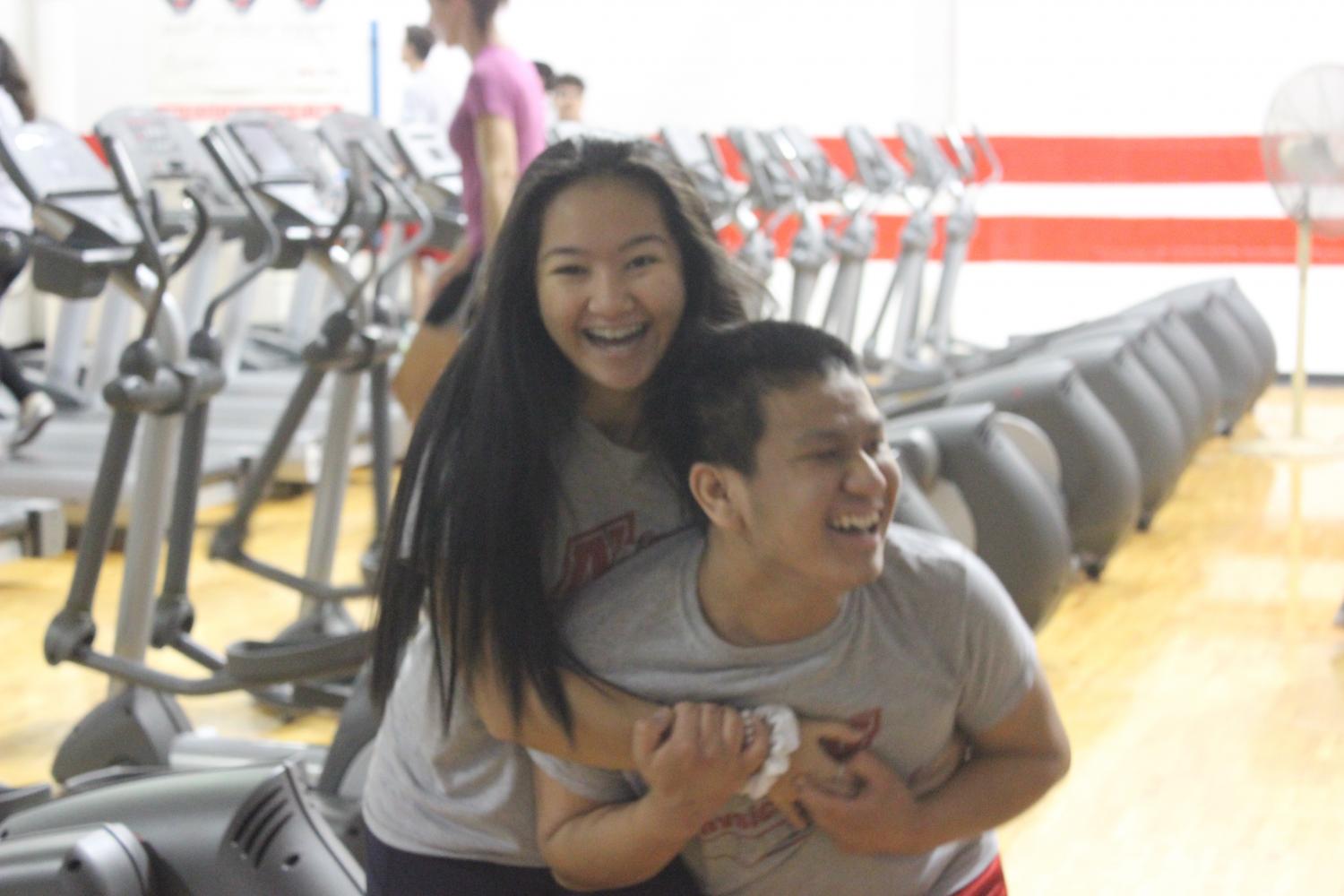Andrea Adap: Putting Others First
Sep 19, 2017
During second period, you can be sure to find senior Andrea Adap in the integrated gym course, a class composed of general education students assisting special education students. During this period, Adap steadily walks hand-in-hand with a classmate down rows of treadmills. When asked for a photograph, Adap chased down a student she works with often, junior Miles Cananigo, who took the opportunity to race away gleefully.
Adap initially joined the special needs program at West during her sophomore year. She missed a long period of school due to an extended vacation, and the only gym period available for make-ups was second: the physical education class designated for special education students.
“I had to help one-on-one with a lot of [special education students.] I got to know them, and I realized how much I really enjoyed working with them,” Adap said.
West’s special education program created integrated physical education and Art Appreciation classes. These courses allow general education students to volunteer to work alongside special education students during second period (integrated physical education) and eighth period (integrated Art Appreciation).
Adap, a student heavily involved in West’s arts program, had to decide between taking AP 2-D Design or integrated PE, both courses being offered during second period only. Though this decision was extremely difficult for Adap, she realized that either choice would result in her doing something she was passionate about.
“I realized I’m not going to have enough time with [the special education students,] and I’m leaving in a year. I want to have as much time with them as possible, so I sacrificed one thing for another,” Adap said. “I chose to stay with the kids instead of another thing I love because, either way, I’m doing something I love.”
Over the years, Adap has gained confidence in working with the students. When she began, she was anxious about volunteering in the classroom. Now, she is always keen to assist for as long as possible.
“I think it’s kind of funny because when she first started helping out, she only helped out in the gym class,” Pathways instructor Shaun Kennedy said. “For the first two years, I didn’t even know who Andrea was. She was very shy and [kept] to herself. I asked her last year. I said, ‘how come this is the first year you’ve actually come to the [special education] classroom?’ And she said, ‘I was always too scared to come in and help out. I didn’t know if we were allowed to.’ She came in a couple times, and you could see her becoming more comfortable with new people as well. Like I said, it was very funny. From the first year, she never came to the class because she was nervous about it, and now, we can’t get rid of her… which is a good thing! We can’t get rid of her by any means.”
A student Adap works with often is Miles Cananigo. Cananigo is typically shy around people, but he and Adap have developed a close bond.
“Miles doesn’t talk to a lot of people,” senior Jacob Bobilies said. “Andrea was with him last year. All of the other people [in the integrated P.E. classroom], he doesn’t talk to. She’ll talk to Miles in Tagalog [a language native to the Philippines,] and that calms him down. He listens to her. All of the kids love her.”
Cananigo is non-verbal and communicates using a vocational device. He may appear rather stand-offish due to his timid disposition, but when asked about Adap, he responded more than usual.
When asked if he enjoyed Adap’s presence, he agreed. When asked if he thought Adap was nice, he agreed. When asked if he believed Adap helped him during class, he agreed again. When asked if he found Adap to be friendly, fun, or awesome, Cananigo responded with “fun.” Adap is with Cananigo during his physical education, lunch, and Art Appreciation courses. When the two walked away, Adap carefully instructed Cananigo on how to stretch his knee to his chest. The two laughed down the gym.
Adap’s calm nature and patience are the primary reason she works so well with the special education students.
“She’s almost a natural working with others. I can see it in her. She’s very calm. Very caring,” Kennedy said. “She identifies a need that a student has, and she will help that student out as far as even the littlest things, from helping a student blow their nose to even cutting up an apple for a student. Very motherly-like. Like I said, she’s just a natural when working with the students. What’s best is that the kids love her to death.”
Working with special education students has many complications. Despite this, Adap remains optimistic because she enjoys staying on her toes to keep pace with the classroom.
“It’s never going to be a perfect day. You can never expect it to be an amazing day,” Adap said. “Some kids have things going on at home that can trigger them; some have different triggers that can change their behavior and actions, and some have anxiety, and others have OCD. Nothing is ever going to be perfect with them which I love because everything is going to be interesting. You never know what’s going to happen, and you have to stay on your feet and keep up.”
Adap believes that most special education students are often misunderstood and unappreciated because they’re not as involved as “normal students.” To counter this, Adap is encouraging the students to become more social and is sharing her personal experiences with them.
“I think that people don’t understand or appreciate them as much as any other normal kid. General education kids don’t view them the same as I would, per se. It really strikes and disappoints me that they aren’t included as much as a normal kid would be. I think it’s unfair, and I am definitely trying to get them to join a lot of clubs to be more social,” Adap said. “Usually, special needs always has a negative outlook on it. A lot of people are like, ‘Oh, this class is bad for them!’ They’re actually amazing people. People just need to get to know them. They can do so much more than we thought they could.”
After graduation, Adap’s hopes to begin her career occupational therapist. Soon, she will begin shadowing an occupational therapist at West. This commitment to positively impact the students proves that Adap will be exceptional when it comes occupational therapy.
“If that’s truly what she wants to do, I think she is going to be excellent due to that motherly way and the way she cares about the students,” Kennedy said. “It’s very difficult. When you talk to my students, you don’t always get that feedback. You don’t always know that you’re making a difference, but she sticks with it. She’s going to do an awesome job.”




